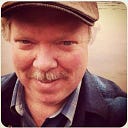At the Edges of American Political Culture People Are Tweeting Hard
Cal Newport is one among a select few voices (along with Douglas Rushkoff and Rishad Tobaccowala) currently speaking truths about modern media and culture that I pay particular attention to and I enjoy hearing from.
Newport is the author of seven books and an associate professor of computer science at Georgetown University. In his latest piece for The New Yorker, and in the wake of news that Elon Musk intends to buy the platform, he wonders if the framing of Twitter as the new town square is accurate?
The original users of the platform, attracted by the optimistic appeal of sharing and discovery, began to flee, leaving behind a more radicalized band of keyboard warriors. For evidence of this shift, social psychologist Jonathan Haidt points to the “Hidden Tribes” study of American political attitudes and core beliefs, which was conducted by the nonprofit organization More in Common in 2017 and 2018. The survey partitioned respondents into seven “tribes” defined by shared beliefs and behavior. The group farthest to the left, the “progressive activists,” contained only eight percent of the population, and the group furthest to the right, “devoted conservatives,” contained only six percent. Combined, however, these two political extremes were much more likely to share political content on social media than the less partisan groups. As Haidt emphasizes, these two groups are also the whitest and richest of those studied, meaning that Twitter’s increasingly heated wrangling is not just far from a considered democratic debate but has truly become a spectacle driven by a narrow and unrepresentative group of élites.
It’s not much of a town square when the so-called “Exhausted Majority” is not part of the discussions or proceedings.
Newport concludes:
We’ll likely never persuade the narrow bands of Twitter power users to change their frenetic ways, but the time has come to demand that those who remain at the periphery of this scrum, and who still take seriously its ever-shifting landscape of heroes and villains, redirect their attention somewhere more productive.
The insular clubby thinking that is found “Inside the Beltway” is bad enough. Do we also need to pay attention to a world fabricated by those who work and play “Inside the Tweetway?”
Seventy years ago, journalist A.J. Liebling wrote, “fortune swims, not with the mainstream of letters, but in the shallows where the suckers moon.” He was correct then and he’s correct now. Twitter is a place where salacious gossip and hot takes spread like wildfire. Twitter is the shallows and therein lies its appeal. Fractured text, lack of context, and the feeble thinking that results is not a bug, it’s a feature.
Twitter is also one of the least successful of the major social-media companies, with revenues last year just one-twentieth of Meta’s. So, why all the noise about town squares and the future of a platform that isn’t all that?
David Burn writes poems, stories, news, opinion and advertising. He lives in the Lost Pines of Bastrop, Texas with his wife, Darby, and dog, Lucy Spotted Tongue.
